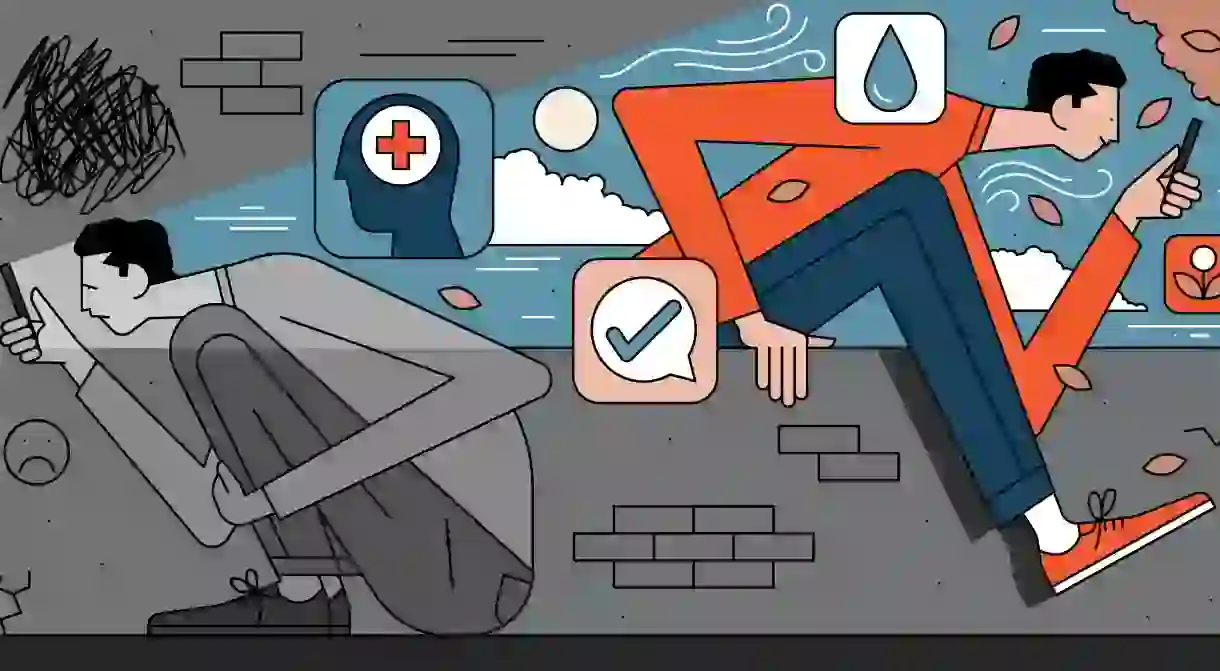The Best Free Mental Health Apps for Anxiety, Stress and Depression

Mental health apps have made therapeutic techniques more accessible, portable and cost-effective. Although digital tools shouldn’t be seen as a substitute for traditional therapy, these apps can help you manage any issues you may be having while allowing for privacy and confidentiality.
Calm
Apple’s 2017 App of the Year award winner, Calm, offers guided meditations, Sleep Stories and breathing programmes. Sessions are all under 25 minutes, with topics ranging from self-esteem and relationships to tools for practising mindfulness at work. Whether you’ve never tried meditation before or regularly practise, you’re likely to find a Calm programme that’s right for you.

Happify
Happify helps you conquer negative thoughts, cope better with stress, build self-confidence, fuel career success and practise mindfulness through meditation. Split into tracks of engaging games, activity suggestions, gratitude prompts and bite-size quizzes, Happify guides you to seeing more positive aspects of daily life.
CBT Thought Diary
Using cognitive behavioural therapy (CBT), a technique centred around changing feelings by identifying negative and distorted thinking patterns, CBT Thought Diary lets you document emotions, analyse flaws in your thinking and re-evaluate your thoughts to gradually improve your approach to anxiety-inducing situations.

Self-Help for Anxiety Management (SAM)
The Self-Help for Anxiety Management (SAM) app helps users build their own Anxiety Toolkit from a selection of 25 in-app resources ranging from physical relaxation techniques to mental relaxation and health strategies. The app also has a Social Cloud feature, which enables users to share experiences with the SAM community while protecting their identities.
What’s Up?
What’s Up? uses both CBT and acceptance and commitment therapy (ACT), a technique that helps you acknowledge life’s difficulties to enable you to cope with depression, anxiety and stress. Features include a positive and negative habit tracker to help you maintain good habits and break those that are counterproductive, a Get Grounded page containing more than 100 different questions to pinpoint what you’re feeling and a Thinking Patterns page, which teaches you how to stop negative internal monologues.

MindShift
Rather than trying to avoid anxiety, MindShift uses CBT to help change attitudes towards it. Designed specifically for teens and young adults, the app has tools to tackle sleep problems, intense emotions, perfectionism, social anxiety and more.
MoodTools
Aiming to support people with clinical depression, MoodTools offers a CBT-based diary to log and analyse thoughts, helpful videos that can improve mood and behaviour, and a suicide safety plan.

Wednesday 10 October is World Mental Health Day. To highlight this, Culture Trip is looking at how different societies are shining a light on this important issue in innovative and alternative ways.
The content of this article is provided for general information only and is not an attempt to practise medicine or give specific medical advice, including, without limitation, advice concerning the topic of mental health. The information contained in this article is for the sole purpose of being informative and is not to be considered complete, and does not cover all issues related to mental health. Moreover, this information should not replace consultation with your doctor or other qualified mental health providers and/or specialists. If you believe you or another individual is suffering a mental health crisis or other medical emergency, please seek medical attention immediately.
If you are experiencing mental health issues, in the UK, Samaritans can be contacted on 116 123 or email jo@samaritans.org. You can contact the mental health charity Mind by calling 0300 123 3393 or visiting mind.org.uk. Please note there are no affiliations of any kind between the aforementioned organisations and Culture Trip.













